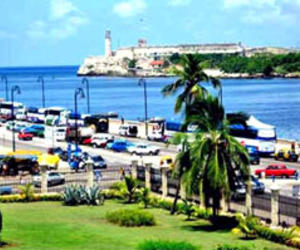Cuba-USA relations
- Submitted by: manso
- Editorial Articles
- 03 / 16 / 2011

By Stabroek staff. Editorial.Wednesday, March 16, 2011. In spite of periodic hiccups, a slow but fairly consistent positive evolution in Cuba-United States relations continues to be apparent. One of those hiccups occurred at the end of last week, when an American contractor, ostensibly assisting persons and groups in Cuba with internet communications, was sentenced to 15 years in prison by a Cuban court, an act strongly objected to by the US government.
The US has claimed that the individual, Alan Gross, was an experienced international development worker, functioning under the auspices of a project supported by USAID funds.
The Cuban government has recognized that with the election of Barack Obama to the presidency of the United States, the new President has deliberately sought to ease open person-to-person relationships between the two countries, as evidenced by his resumption of talks on immigration which had been stopped by the George W Bush administration in 2003.
In general, they recognize that Obama has actually sought to reinstate and extend policies on travel and transfer of remittances originally initiated by the Clinton administration. And while they have criticized Obama’s initiatives as “of limited reach,” they have had to concede that he has been persistent in pursuing them, over time. Thus in spite of the arrest, and their insistence on court proceedings against Gross, and the Obama administration’s own insistence that this incident could become a “sticking point” in US relations, the Cuban government will have recognized that in January of this year the President allowed the continuation of talks between immigration officials of both countries. And more recently, last week, as court proceedings were in train, the US government increased the number of American airports from which charter flights between Cuba and the United States can be undertaken.
The President has had to renege on his election promise to end the incarceration of alleged al Qaeda operatives in Guantanamo. But this has not been construed as a reason for freezing or slowing down discussions between the two parties. In much the same way, as the Cubans will have appreciated, the European Union has not used its own objection to Cuba’s insistence that released prisoners should depart their country for residence in Europe, as an excuse for slowing down the evolution of relations between the EU and Cuba (and indeed this week the Cuban government permitted a released prisoner who refused to depart for Spain to remain free in Cuba).
Caricom states, which early on (1972) will have insisted on recognition of Cuba under Fidel Castro’s leadership, will no doubt be pleased with the line being taken by President Obama. Jamaica, which broke relations with Cuba in 1980 has now, with the assumption of office by Prime Minister Golding, quickly made the normalization of relations with Cuba a bipartisan matter in the political party relations of the country. Of course, in the interim, Jamaica will have seen the enthusiastic pursuit of Cuba-United States agricultural trade, regardless of which party was in office in Washington.
The Caricom-Cuba Commission proceeds to develop practical economic and social relations between Cuba and the community, and a new telecommunications line initiated from Venezuela has now connected that country to Cuba and Jamaica. The community obviously recognizes what, in its majority, it has always felt – that the geography of US-Cuban relations would, in the post-Cold War era, evolve in a positive direction, to the benefit of both countries on a scale that Caricom can hardly envisage for itself.
President Obama himself has, from his assumption of office, carried through a diplomacy of openness to various regions of what we used to call the Third World, this being most obvious in his early initiatives towards the Middle Eastern world. And it is clear that he has recognised a change of approach in the American hemisphere itself, the larger states like Brazil, Mexico and now Colombia under new President Manuel Santos, being desirous of ensuring a more relaxed arena of relations in this part of the world, regardless of the nature of governments existing. For the hemispheric states themselves recognize that the evolution taking place in the management of the Cuban economy will have substantial effects on the Cuban economic and political system as a whole, especially in a period of imminent change of ruling generations.
Cuba itself, under Raúl Castro is showing that it recognized that there are new rules of economic engagement emerging in the relations between states, as China and India in particular take a major place in world trade and production, having accepted some of the precepts of economic liberalization that now dominate decision-making among the major powers. A period of trial and error is in train in Cuba, and the same will apply in the relations between the US and itself.
Source: /www.stabroeknews.com/2011/opinion/editorial/03/16/cuba-united-states-relations/
Comments